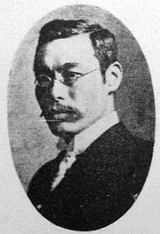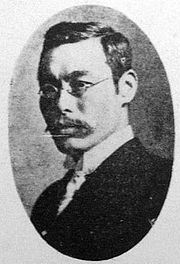
Futabatei Shimei
Encyclopedia

Japanese people
The are an ethnic group originating in the Japanese archipelago and are the predominant ethnic group of Japan. Worldwide, approximately 130 million people are of Japanese descent; of these, approximately 127 million are residents of Japan. People of Japanese ancestry who live in other countries...
author
Author
An author is broadly defined as "the person who originates or gives existence to anything" and that authorship determines responsibility for what is created. Narrowly defined, an author is the originator of any written work.-Legal significance:...
, translator
Translation
Translation is the communication of the meaning of a source-language text by means of an equivalent target-language text. Whereas interpreting undoubtedly antedates writing, translation began only after the appearance of written literature; there exist partial translations of the Sumerian Epic of...
, and literary critic
Critic
A critic is anyone who expresses a value judgement. Informally, criticism is a common aspect of all human expression and need not necessarily imply skilled or accurate expressions of judgement. Critical judgements, good or bad, may be positive , negative , or balanced...
. Born Hasegawa Tatsunosuke (長谷川 辰之助) in Edo
Edo
, also romanized as Yedo or Yeddo, is the former name of the Japanese capital Tokyo, and was the seat of power for the Tokugawa shogunate which ruled Japan from 1603 to 1868...
(now Tokyo
Tokyo
, ; officially , is one of the 47 prefectures of Japan. Tokyo is the capital of Japan, the center of the Greater Tokyo Area, and the largest metropolitan area of Japan. It is the seat of the Japanese government and the Imperial Palace, and the home of the Japanese Imperial Family...
), Futabatei's works are in the realist
Literary realism
Literary realism most often refers to the trend, beginning with certain works of nineteenth-century French literature and extending to late-nineteenth- and early-twentieth-century authors in various countries, towards depictions of contemporary life and society "as they were." In the spirit of...
style popular in the mid- to late-19th century. His work Ukigumo (Floating Clouds
The Drifting Cloud
The Drifting Cloud, known as Ukigumo in Japanese, was a novel written in 1887 by Futabatei Shimei, often called the first modern Japanese novel. The novel was published in two sections in 1887 and 1888. The novel only contains four characters, prioritising the development of characters over plot...
, 1887) is widely hailed as Japan's first modern novel.
Biography
After quitting his studies at the Russian languageRussian language
Russian is a Slavic language used primarily in Russia, Belarus, Uzbekistan, Kazakhstan, Tajikistan and Kyrgyzstan. It is an unofficial but widely spoken language in Ukraine, Moldova, Latvia, Turkmenistan and Estonia and, to a lesser extent, the other countries that were once constituent republics...
department at the Tokyo Foreign Language School (東京外国語学校 Tōkyō Gaikokugo Gakkō) in protest over administrative restructuring, Futabatei published the literary criticism Shōsetsu Sōron at the encouragement of the critic and author Tsubouchi Shōyō
Tsubouchi Shoyo
__NoTOC__ was a Japanese author, critic, playwright, translator, editor, educator, and professor at Waseda University. He was born Tsubouchi Yūzō , in Gifu prefecture...
in 1886. Futabatei's first novel Ukigumo was never finished, but its realist style strongly influenced fellow authors in his day. Futabatei was accomplished in Russian and translated the work of Ivan Turgenev
Ivan Turgenev
Ivan Sergeyevich Turgenev was a Russian novelist, short story writer, and playwright. His first major publication, a short story collection entitled A Sportsman's Sketches, is a milestone of Russian Realism, and his novel Fathers and Sons is regarded as one of the major works of 19th-century...
and other Russian realists into Japanese.
In 1902, he learned Esperanto
Esperanto
is the most widely spoken constructed international auxiliary language. Its name derives from Doktoro Esperanto , the pseudonym under which L. L. Zamenhof published the first book detailing Esperanto, the Unua Libro, in 1887...
in Russia. Returning to Japan in 1906, he published the first Japanese-Esperanto instruction book "世界語" Sekaigo.
Futabatei died of tuberculosis on the Bay of Bengal
Bay of Bengal
The Bay of Bengal , the largest bay in the world, forms the northeastern part of the Indian Ocean. It resembles a triangle in shape, and is bordered mostly by the Eastern Coast of India, southern coast of Bangladesh and Sri Lanka to the west and Burma and the Andaman and Nicobar Islands to the...
while returning from Russia as a special correspondent for the Asahi Shimbun
Asahi Shimbun
The is the second most circulated out of the five national newspapers in Japan. Its circulation, which was 7.96 million for its morning edition and 3.1 million for its evening edition as of June 2010, was second behind that of Yomiuri Shimbun...
newspaper. He was cremated and buried in Singapore.
The origin of his pen name is in the curse his father said when told by his son that he aspired to study literature: Kutabatte shimee (くたばってしめぇ), "Drop dead!".
Works
Criticism- Shōsetsu Sōron 小説総論 (1886)
Novels
- Ukigumo 浮雲, known as The Drifting CloudThe Drifting CloudThe Drifting Cloud, known as Ukigumo in Japanese, was a novel written in 1887 by Futabatei Shimei, often called the first modern Japanese novel. The novel was published in two sections in 1887 and 1888. The novel only contains four characters, prioritising the development of characters over plot...
in English (1887) - Sono Omokage 其面影 (1906), engl. An Adopted Husband
- Heibon 平凡 (1907)
External links
- e-texts of Shimei's works at Aozora bunkoAozora BunkoAozora Bunko is a Japanese digital library. This online collection encompasses several thousands of works of Japanese-language fiction and non-fiction. These include out-of-copyright books or works that the authors wish to make freely available....
- Shimei's grave in Singapore's Japanese Cemetery

